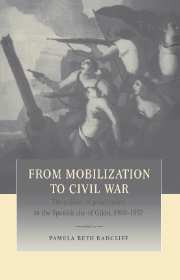Book contents
- Frontmatter
- Contents
- List of maps
- List of tables
- Acknowledgments
- Glossary of terms and abbreviations
- Introduction
- 1 A turning point: the city in 1900
- PART I Patterns of life in working-class Gijón
- PART II Institutional forces of opposition: republicans and anarchosyndicalists
- 4 The republican parties and municipal politics, 1900–1930
- 5 The republicans in power: municipal politics, 1931–1936
- 6 The trade union movement, 1900–1936
- PART III Defining an oppositional culture: the struggle over the public sphere
- PART IV The urban battlefield: conflict and collective action, 1901–1936
- Conclusion
- Appendix 1 Wage and price movement
- Appendix 2 Occupations by status category
- Appendix 3 Supplementary tables
- Select bibliography
- Index
5 - The republicans in power: municipal politics, 1931–1936
Published online by Cambridge University Press: 31 October 2009
- Frontmatter
- Contents
- List of maps
- List of tables
- Acknowledgments
- Glossary of terms and abbreviations
- Introduction
- 1 A turning point: the city in 1900
- PART I Patterns of life in working-class Gijón
- PART II Institutional forces of opposition: republicans and anarchosyndicalists
- 4 The republican parties and municipal politics, 1900–1930
- 5 The republicans in power: municipal politics, 1931–1936
- 6 The trade union movement, 1900–1936
- PART III Defining an oppositional culture: the struggle over the public sphere
- PART IV The urban battlefield: conflict and collective action, 1901–1936
- Conclusion
- Appendix 1 Wage and price movement
- Appendix 2 Occupations by status category
- Appendix 3 Supplementary tables
- Select bibliography
- Index
Summary
The municipal elections of April 12,1931 produced perhaps the greatest show of republican unity and popular support ever seen in Gijón. On April 13, hours before the news arrived from Madrid, the city carried out its own peaceful revolution that culminated in the declaration of the Republic and the release of political prisoners that evening. The process began at 2 p.m., when a large crowd convinced the newly elected republican councilors to lead a march to city hall and demand the resignation of the monarchist city council. Later that afternoon, all of the coalition parties met and constituted a revolutionary committee to monitor the transition. By early that evening, with still no word from Madrid, the committee took the responsibility of officially declaring the Republic in Gijón. In the Plaza de la Constitutión in front of the city hall, an enormous crowd watched in silence as the republicans raised the Federalist flag (the only non-monarchist one available). Afterwards, “the enthusiasm overflowed and the shouts of ‘long live the Republic’ multiplied. People embraced each other emotionally, while many men threw their hats into the air as a sign of jubilation.”
After the inaugural act, the crowd moved on to the jail, led by the young Reformist lawyer, Dionisio Morán, who became the orator of the transition. With approval wired from Oviedo for the release of the mostly anarchist political prisoners, Morán and another Reformist lawyer, Mariano Merediz, presided over their liberation. After an emotional public reunion with family and friends, the twenty-three prisoners and their retinue began a triumphant procession to city hall, cheered on by jubilant crowds.
- Type
- Chapter
- Information
- From Mobilization to Civil WarThe Politics of Polarization in the Spanish City of Gijón, 1900–1937, pp. 142 - 166Publisher: Cambridge University PressPrint publication year: 1997



